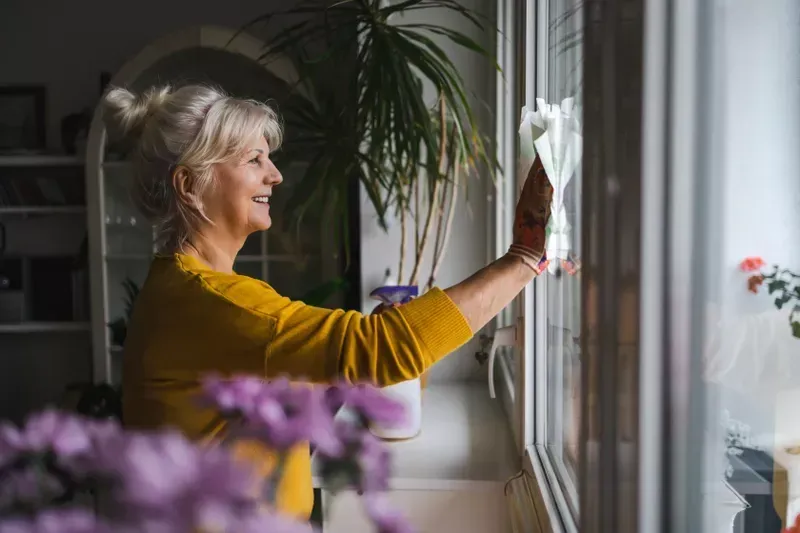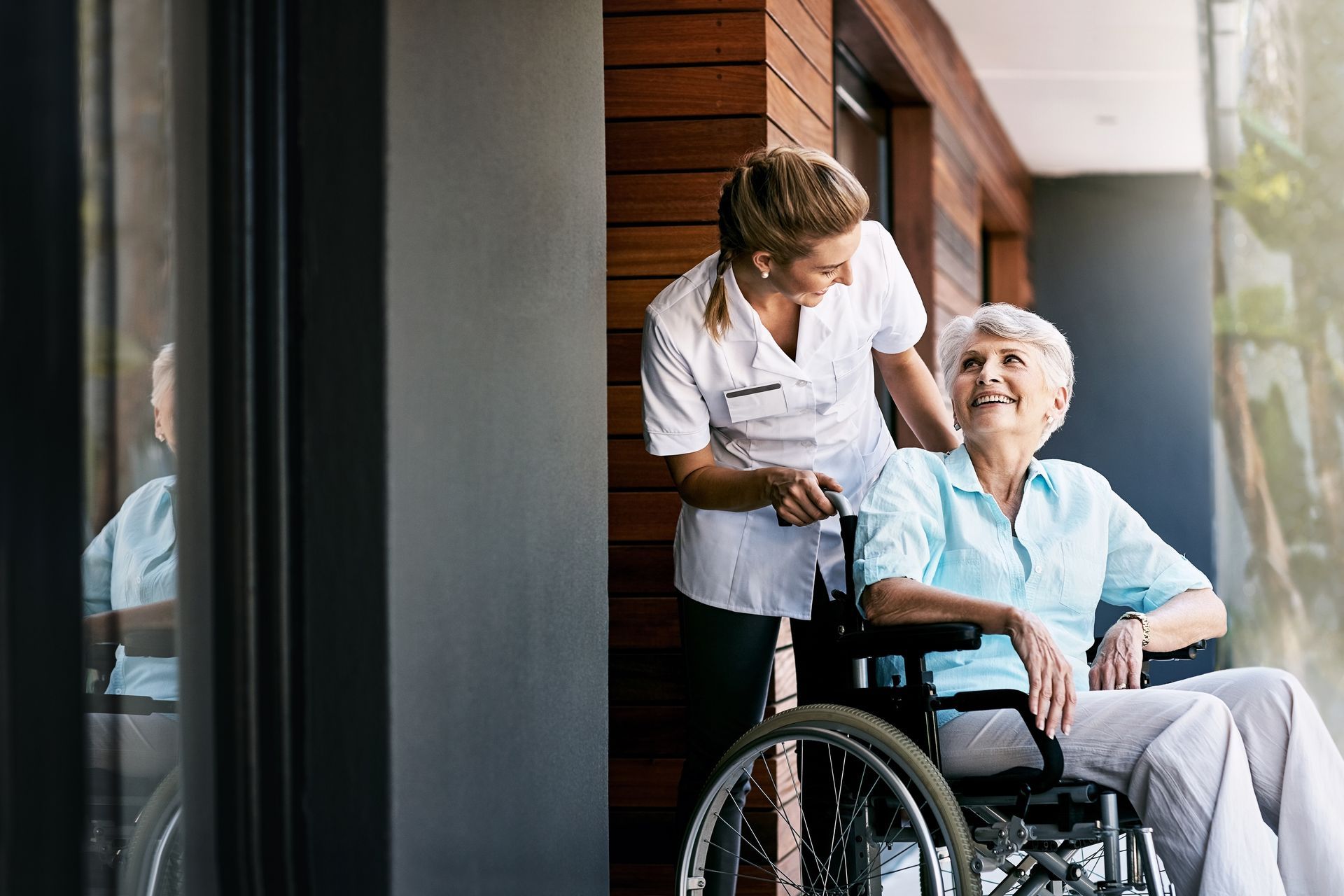BLOG
Spring Cleaning for Seniors: Decluttering Tips for a Safer and More Comfortable Living Space
Spring is an ideal time for seniors to refresh their living spaces, enhancing safety and comfort. A well-organized home reduces the risk of accidents and promotes overall well-being. Engaging in spring cleaning can also provide a sense of accomplishment and rejuvenation. However, it's essential to approach this task with strategies tailored to seniors' unique needs.
1. Prioritize Safety During Spring Cleaning
Safety should be the foremost consideration for seniors during spring cleaning. Identifying and addressing potential hazards can prevent accidents and injuries. Begin by assessing each room for common risks such as loose rugs, cluttered walkways, and poorly lit areas. Removing or securing loose rugs and ensuring clear pathways can significantly reduce trip hazards.
Proper lighting is crucial in preventing falls. Ensure all areas, especially stairways and hallways, are well-lit. Replacing dim or burnt-out bulbs and adding nightlights in key areas can enhance visibility. According to the National Council on Aging, falls are the leading cause of fatal and non-fatal injuries for older Americans.
When decluttering, it's important to avoid overexertion. Seniors should take regular breaks and avoid lifting heavy objects without assistance. Using appropriate tools, such as step stools with handrails, can help reach high places safely. Enlisting help from family members or professional services can also ensure tasks are completed safely.
Incorporating non-slip mats in moisture-prone areas, like bathrooms and kitchens, can prevent slipping. Securing electrical cords along walls and out of pathways reduces tripping risks. Regularly checking the condition of assistive devices, such as handrails and grab bars, ensures they provide adequate support. Maintaining these safety measures contributes to a secure living environment.
2. Organize Personal Belongings for Better Accessibility
Efficient organization enhances seniors' safety and convenience. Frequently used items should be stored within easy reach to minimize the need for bending or stretching. Clear, labeled containers can make it easier to locate belongings. Adjustable shelving units can be customized to suit individual needs, reducing physical strain.

Closet organization is another key aspect. Installing lower rods and shelves can make clothing more accessible. Hooks for everyday items like coats and bags keep them within reach. According to a study by the National Institute on Aging, organized living spaces can improve seniors' daily functioning.
In the kitchen, logically arranging utensils and cookware can streamline meal preparation. Placing heavy pots and pans on lower shelves prevents the need for overhead lifting. Drawer organizers can keep utensils neatly separated, reducing clutter. Labeling pantry items can also help quickly identify their contents.
A dedicated area can prevent confusion in medication management. Pill organizers with compartments for different times of the day ensure proper dosage. Keeping a medication list with dosages and schedules can be a helpful reference. It is also advisable to regularly review medications with a healthcare provider.
Digital organizations can further enhance accessibility. Setting up electronic reminders for appointments and medications can aid memory. Organizing important documents in clearly labeled digital folders ensures easy retrieval after spring cleaning. Utilizing technology, such as voice-activated assistants, can also assist in daily tasks.
3. Dispose of Unnecessary Items Responsibly
Decluttering often involves parting with items that are no longer needed. Responsible disposal frees up space and benefits the community and environment. Start by sorting belongings into categories: keep, donate, recycle, and discard. This systematic approach simplifies the decision-making process.
Donating gently used items can support local charities. Organizations often welcome clothing, household goods, and furniture in good condition. Many charities offer pickup services, making it convenient for seniors to contribute.
Recycling is another key component of responsible disposal. Materials like paper, glass, and certain plastics can be processed and reused. Checking local recycling guidelines ensures items are sorted correctly. Proper recycling reduces landfill waste and conserves natural resources.
Some items require special disposal methods. Electronics, batteries, and hazardous materials should not be thrown in regular trash. Many communities have designated drop-off locations or events for these materials. Proper disposal prevents environmental contamination and adheres to local regulations.
Consider digitizing memories for items with sentimental value. Scanning photos and documents preserves them without the need for physical storage. Creating digital photo albums or memory books can be a fulfilling project. This approach maintains emotional connections while reducing physical clutter.
4. Maintain Outdoor Spaces for Safety
Outdoor areas are extensions of the living environment and require attention during spring cleaning. Well-maintained exteriors enhance safety and provide enjoyable spaces for relaxation. Begin by inspecting walkways and driveways for cracks or uneven surfaces. Repairing these issues can prevent trips and falls.
Clearing debris from pathways ensures unobstructed access. Cleaning up leaves, branches, and other debris reduces slipping hazards. Ensuring that pathways remain dry and free from moss or algae prevents accidental falls. Installing handrails along steps or sloped areas provides extra stability. Regularly sweeping and maintaining these areas enhances overall safety.
Proper lighting in outdoor spaces is essential for evening safety. Motion-sensor lights can illuminate pathways without needing manual operation. Replacing burnt-out bulbs in porch or yard lighting ensures visibility at night. The NIH reports that good lighting can reduce fall risks for seniors by up to 50%.

Gardens and patios should also be decluttered for accessibility. Organizing outdoor furniture to allow clear walking paths prevents tripping. Raised garden beds offer an ergonomic solution for seniors who enjoy gardening. Storing tools in easily accessible locations minimizes unnecessary bending or reaching.
If seniors have difficulty maintaining their outdoor spaces, professional help can be beneficial. Landscaping services can handle tasks like trimming overgrown bushes and maintaining lawns. Gutter cleaning services can ensure proper drainage and prevent water buildup near entryways. Enlisting family or community volunteers can also be a cost-effective way to maintain outdoor areas.
5. Improve Air Quality and Reduce Allergens with Spring Cleaning
Spring cleaning provides an opportunity to enhance indoor air quality. Poor air circulation and dust accumulation can trigger allergies or respiratory issues. Regular vents, filters, and fabric cleaning can significantly improve air quality. Seniors should prioritize reducing airborne pollutants for a healthier living space.
Dust and pet dander are common indoor allergens. Using microfiber cloths to wipe down surfaces traps more dust than traditional dusters. Washing curtains, bedding, and upholstered furniture removes allergens. A vacuum with a HEPA filter is most effective in capturing fine dust particles.
Air purifiers can help maintain clean indoor air. Devices with HEPA filters effectively remove allergens and airborne contaminants. Placing purifiers in bedrooms and living areas maximizes their benefits. According to the EPA, HEPA filters can remove up to 99.97% of airborne particles.
Reducing moisture buildup prevents mold growth. Using a dehumidifier in damp areas like basements or bathrooms minimizes excess humidity. Regularly checking for leaks in plumbing or roofs can prevent water damage. Mold can exacerbate respiratory issues, making moisture control essential for senior health.
Houseplants can naturally improve air quality. Certain plants, like snake plants and peace lilies, absorb toxins and release oxygen. However, if pets or grandchildren frequently visit, it's important to research which plants are non-toxic. Keeping plants well-maintained ensures they remain beneficial rather than contributing to mold growth.
Find the Right Support for Safe and Comfortable Living
A clean and organized home enhances the safety, health, and overall well-being of seniors. Spring cleaning offers an opportunity to refresh living spaces and create a more comfortable environment. Decluttering, improving air quality, and maintaining outdoor areas promote a healthier lifestyle.
If home maintenance becomes too challenging, professional support can help. Assisted living communities provide a safe and well-maintained environment with personalized care. At Assured Senior Living, residents enjoy a secure, comfortable home designed to meet their needs.
Our compassionate team ensures that every living space remains organized and hazard-free. With personalized assistance and safety measures, we help seniors maintain their independence and well-being. Contact Assured Senior Living today to learn how we create a safe and supportive environment for our residents.















